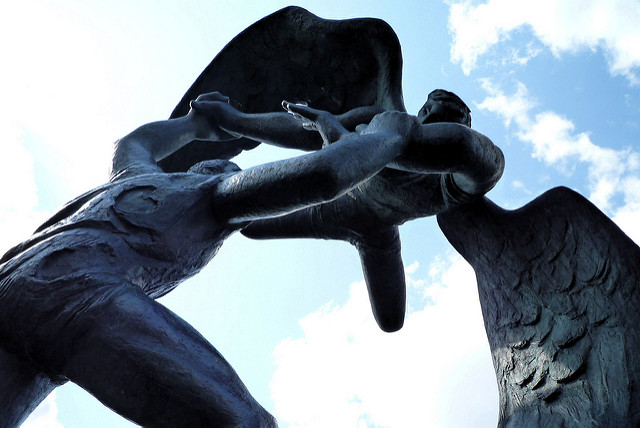Blog

God-Soaked World Bible Guide – Day 4
March 9, 2017
Thursday, March 9 – Genesis 32:22-32
22 The same night Jacob got up and took his two wives, his two maids, and his eleven children, and crossed the ford of the Jabbok. 23 He took them and sent them across the stream, and likewise everything that he had. 24 Jacob was left alone; and a man wrestled with him until daybreak. 25 When the man saw that he did not prevail against Jacob, he struck him on the hip socket; and Jacob’s hip was put out of joint as he wrestled with him. 26 Then he said, “Let me go, for the day is breaking.” But Jacob said, “I will not let you go, unless you bless me.” 27 So he said to him, “What is your name?” And he said, “Jacob.” 28 Then the man said, “You shall no longer be called Jacob, but Israel, for you have striven with God and with humans, and have prevailed.” 29 Then Jacob asked him, “Please tell me your name.” But he said, “Why is it that you ask my name?” And there he blessed him. 30 So Jacob called the place Peniel, saying, “For I have seen God face to face, and yet my life is preserved.” 31 The sun rose upon him as he passed Penuel, limping because of his hip. 32 Therefore to this day the Israelites do not eat the thigh muscle that is on the hip socket, because he struck Jacob on the hip socket at the thigh muscle.
Points of Interest:
- Isaac, Abraham’s son, has grown up and had children himself, two twins in fact. Isaac’s favorite, Esau, is the strong, silent type, but not very shrewd. Isaac’s wife’s favorite, Jacob, is far more clever and ambitious, but also highly manipulative in his patterns of achieving success. As a grown man, Jacob is – for his times – fabulously wealthy and also is now a patriarch of his own large, complicated, polygamous household. Where we pick up the story, Jacob hasn’t seen his angry, potentially vengeful brother, Esau, in many years but plans on meeting him the next day. He’s also alone at night for the first time in many years, in the darkness of Palestine’s pre-electricity, pitch black wilderness.
- Jacob is ambushed in the middle of the night. Options for who this might be: (a) Jacob’s angry brother Esau, attacking him before he can prepare to defend himself. Or (b) a bandit, come in the night to rob and kill him. Either way, this is bad news, and Jacob starts fighting.
- As the wrestling continues long into the night, and then – near dawn – Jacob’s opponent exerts suddenly massive strength and injures him, Jacob wonders if this is some kind of spiritual being he’s wrestling. Long night, polytheistic culture – who knows?
- Turns out Jacob is right. Jacob longs for blessing – positive words about his future that carry authority. You can read the back story yourself in Genesis if you like, but Jacob has been longing for this his whole life, as the only blessing his own father ever gave him was one he stole. It was meant for his brother, not for him.
- Jacob is blessed, and the blessing is a new name – Israel, which means “struggles with God”. Jacob’s good news is that God wants to know him and interact with him. This god is there to be Jacob’s object of worship and allegiance, but also to be Jacob’s – and by extension, his descendants’ – sparring partner over the most substantive matters of life.
- Names become very important in this passage. Jacob gets a new name that ties his story to God’s. Turns out this name will stick to all biological and spiritual descendants of Jacob – people who can struggle/wrestle with God, be blessed, and live. Jacob renames the spot of land where this happened “Peniel,” because he thinks he has seen the very face of God. The one name that’s not given is the mysterious nighttime wrestler/angel/god-figure. In ancient religions, naming was a way of gaining power over the one named, and it’s clear who maintains authority in this scene.
- As a reminder of the power imbalance in this encounter, Jacob leaves with a limp. Symbolically, he’s no longer an ambitious striver, hoping to know God and earnestly trying to prove himself in the world. Instead, he’s secure in his identity as loved and named by God, while accepting that his own mortal condition will always be conditional, weak, incomplete.
Spiritual Exercise: Reread this passage slowly, trying to imagine yourself as Jacob. How does it feel when you are attacked? What does this wrestling look and sound and smell like as it continues through the night? What do you think when you wonder if this is God? How does it feel that God insists you accept your own weakness? What is it like to be blessed, to be told you are known and that you can struggle with God and live to tell the tale?
After the reflection, ask if there’s any question or yearning you have to ask God over these 40 Days. Consider making that your prayer about what you want God to do for you. What would it feel like to “wrestle” with God over this prayer?
Prayer: Pray that God will attack, but then love, one of your six in the middle of the night this week. Should that not occur, or should that prove to be an uncomfortable prayer, ask that God will help one or all of your six speak frankly and honestly with God about their doubts, the struggles, or their questions.

